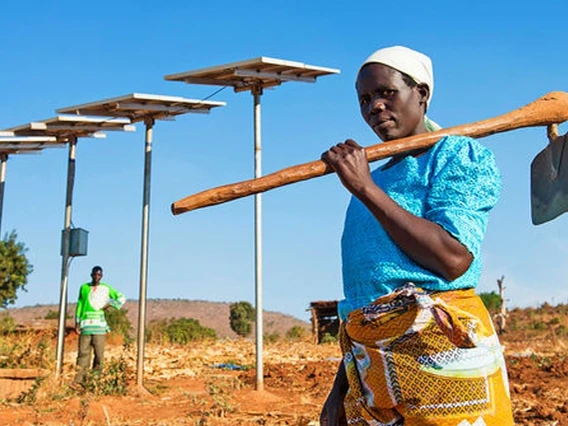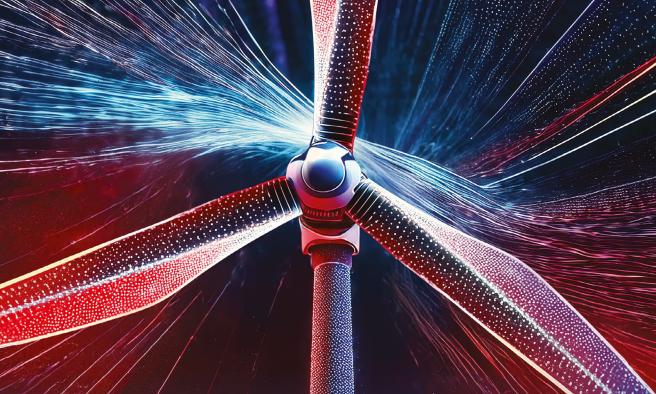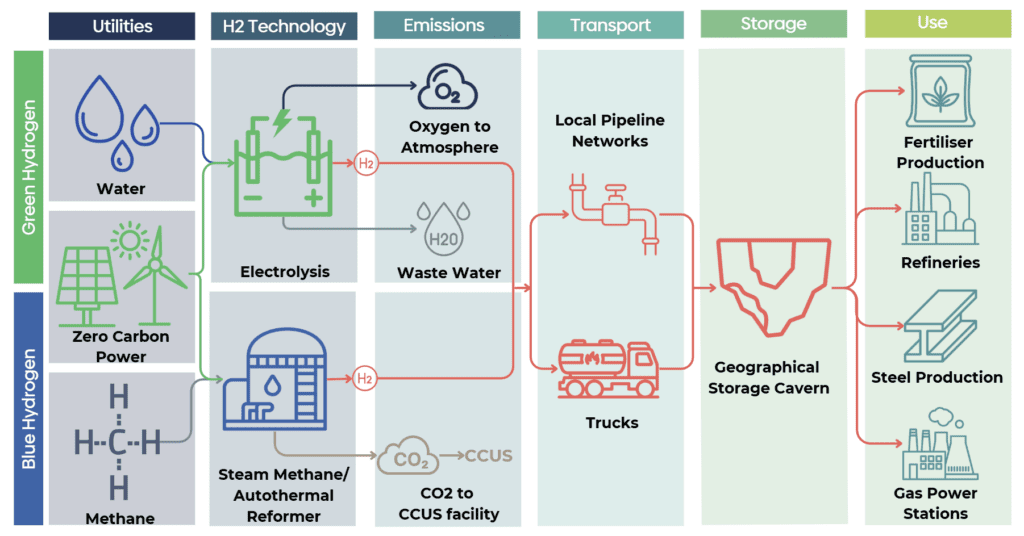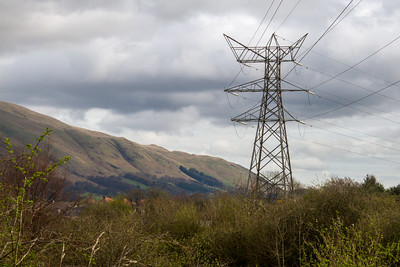In Sub-Saharan Africa, access to clean, reliable energy is problematic. In rural locations, only 31% of the population have access to electricity, and electricity is one of the keys to economic development. Access to electricity is one of the primary indicators for the United Nations Sustainable Development Goal Seven, Affordable and Clean Energy:
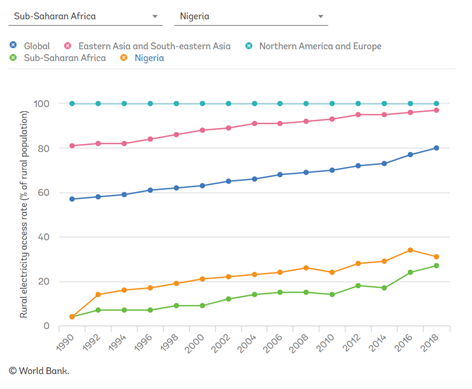
World bank data
I have recently been studying the country of Nigeria in some depth. Nigeria is an interesting case study because it is blessed with enormous natural resources [3]. Nigeria is the largest oil and gas producer in Africa, producing 129,409 ktoe (924 million boe) annually and exporting about 98% of the oil to other countries. Oil production is highly variable, depending on OPEC quotas, but suffice to say, it is an oil-rich nation and the worlds 15th biggest producer annually. It also has a plethora of other natural resources, including minerals and natural energy, including potential for offshore wind, high solar intensities, and plentiful hydro resources [3]–[7] .
Despite this energy wealth, only 57% of the population in Nigeria have access to electricity (31% in rural areas), and in both urban and rural areas electricity is unreliable and prone to daily blackouts:
Looking at the breakdown of energy consumption, and at first glance, it looks like Nigeria is a country based on renewable energy, with biofuels and waste making up most of the consumed energy (IRENA data). That is until you realise that most of this biofuel is low-grade wood or dung used for cooking. In rural areas, less than 10 percent of the population have access to clean cooking [3].
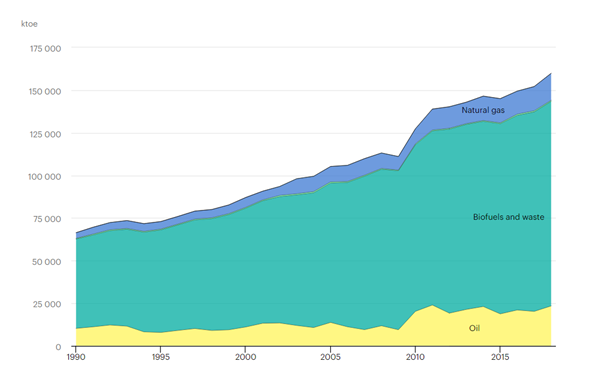
IRENA Data
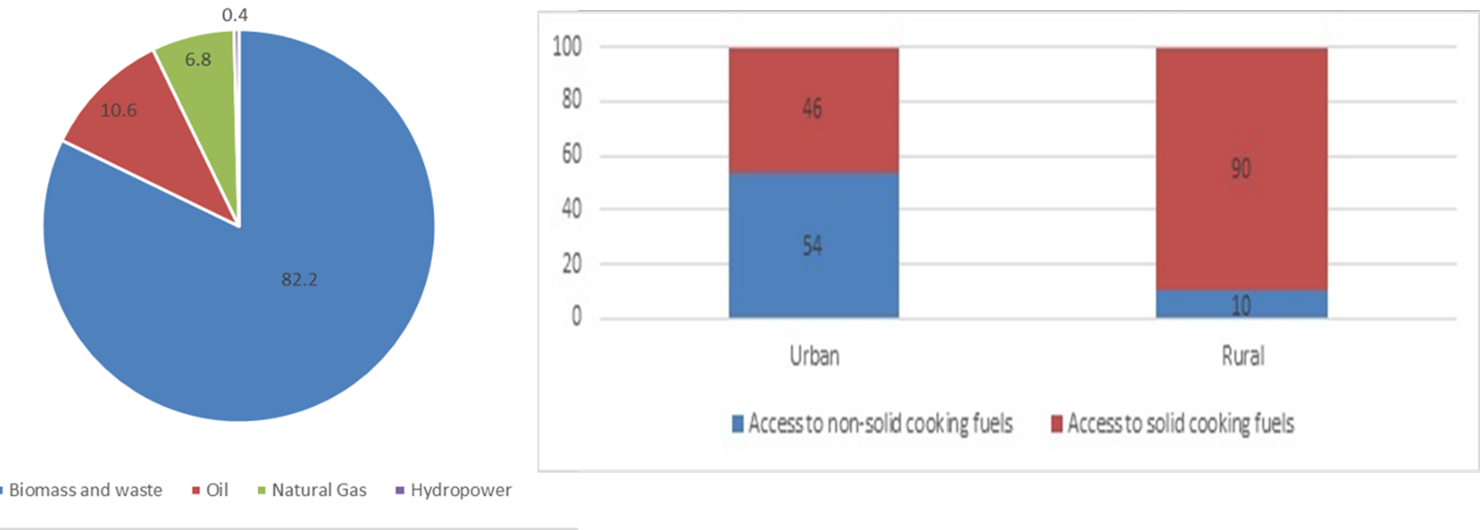
One opinion on the reason for a lack of progress in rural electrification is that
It would appear that a general lack of governance and the poor government has failed to transfer the vast oil wealth into a meaningful and coordinated energy program for rural areas of Nigeria. However, is it that simple? It is worth unpacking Nigerian Energy policy a little further to understand both the efforts to improve energy access and some of the challenges in making it work.
Nigeria is a modern federal democracy with well-established ministries and agencies. Nigerian politics takes place within the framework of a federal, presidential, representative democratic republic, in which the government exercises executive power. Legislative power is held by the government and the legislature’s two chambers: the House of Representatives and the Senate. While much of the responsibility for the country’s day-to-day running is devolved to the states, which have their own executive legislative and judicial arms, amenities like electricity are the sole preserve of federal government. Energy policy is directed by the Federal Ministry of Power (formally the Federal Ministry of Power and Housing). Electricity supply is also subject to regulation by the independent Nigerian Electricity Regulation Committee, which sets prices, issues licences and ensures fair access to the infrastructure [9].
The Federal Ministry of Power is a branch of the Executive, with its budgets and legislation passed by the federal government and approved by the senate. The States also assist ‘by embarking on rural electrification projects. Some state governments have been known to purchase transformers, electric poles and cables in order to assist the distribution companies to extend electricity supply to the people’ [10]
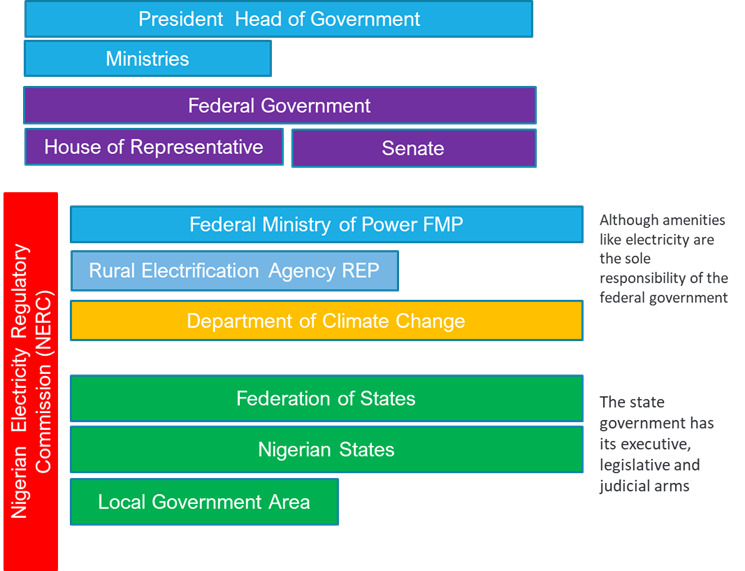
Nigeria has numerous defined energy policies and has a long history of, strategic thinking, goal-setting and legislation, dating back to the formation of the Federal Ministry of Power in 1975. Recent highlights include:
- 2009 publication of the paper, the 20-2020 vision Nigeria’s long-term development strategy designed to ensure that Nigeria becomes one of the world’s top 20 economies by 2020. The target of 40,000 MW by 2020 is mentioned.
- 2009 Rural Electrification Policy Paper (REPP) that sets the target of 10% renewable energy by 2023
- 2012 National Energy Policy (NEEP) and the 2015 National Renewable Energy and Energy Efficiency Policy (NREEP) providing an overarching framework for renewable energy and energy efficiency functioning as an umbrella policy for the various existing documents and serving as a reference document (anchor) for concrete implementation measures.
- 2016 the Rural Electrification Strategy and Implementation Plan (RESIP), increase access to electricity 75% and 90% by 2020 and 2030 respectively and at least 10% of renewable energy mix by 2025 as contained in the National Electric Power Policy (NEPP) of 2001 and the Rural Electrification Policy of 2005.
[11]–[14]
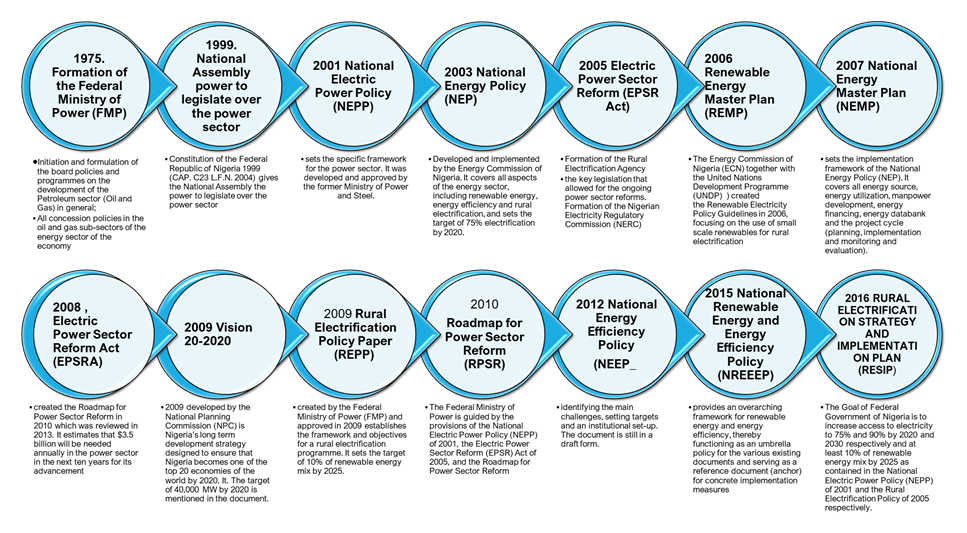
The establishment of the Rural Electrification Agency (REA) created a strong focal point for implementing rural electrification policy and the execution of energy projects [13]. Highlights include:
- The rural electrification fund, designed to subsidise off-grid electrification.
- The energising economies initiative
- The solar home strategy (SHS) bringing small solar projects direct to communities
- The Nigeria Electrification Project that seeks to provide electricity access to households, micro, small and medium enterprises in off-grid communities across the country through renewable power sources
- Solar Power Naja, a new initiative to support the economic recovery in response to the COVID-19 pandemic, the Federal Government of Nigeria (FGN) has launched an initiative as part of the Economic Sustainability Plan (ESP) to achieve the roll-out of 5 million new solar-based connections in communities that are not grid-connected.
- An extensive education programme, including investment in STEM education and education and research in universities.
- An energy database establishing the locations and potential for off-grid projects.
The scale of ambition of the REA is clear, and they indicate the technological trajectory of solar mini-grids including solar panels, battery storage, diesel generator backup and demand-side energy efficiency management through the use of smart energy meters.
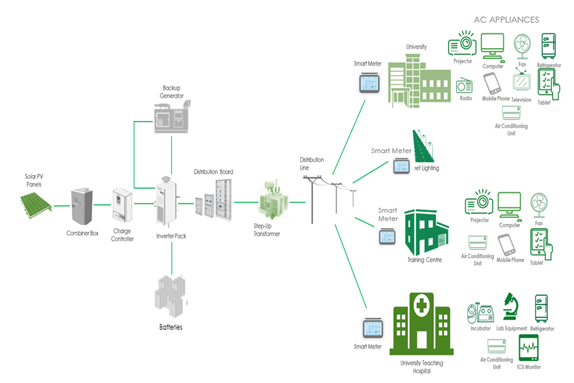
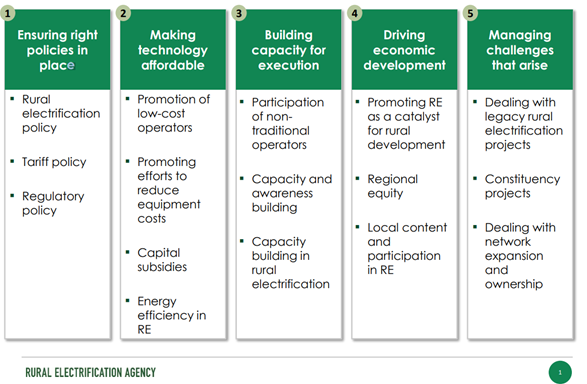
From [13]
There are also very clear targets for renewable energy under NREEP:
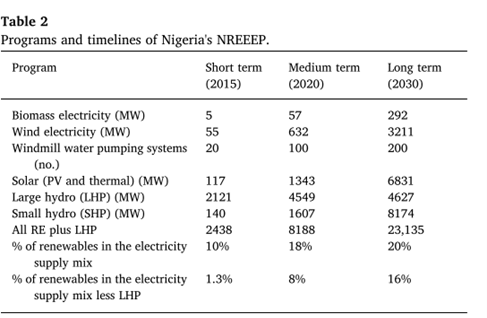
From [5]
There are no shortage of funding initiatives either. These initiatives extend to feed-in-tariffs fiscal incentives and tax cuts for capital expenditure subsidy of new market entrants and mini-grid performance-based grants. Most recently, Nigeria introduced the Green Bond. Nigeria became the first country on the African continent and the fourth globally to issue a security that raises funds for environmental projects and designed to encourage investment [15].
All-in-all, the efforts to bring electricity to rural communities in Nigeria is laudable and perhaps enviable in Africa.
Gugah, in 2019, published a list of recommendation to improve access to energy in Nigeria. Many of the recommendations appear to have been implemented or are in progress of being implemented [5]. However, despite these efforts, based on the latest data, it still seems to be that there is a low level of access to electricity and access to clean cooking is still deficient (IRENA and IEP data). The caveat is that the publication of data usually lags one or two years, and there may have been more recent progress .
Gunga observed that:
We cannot discuss Nigerian Energy Policy (or African Energy Policy for that matter) without broaching the thorny issue of corruption. Nigeria ranks 149 out of 180 in terms of transparency (or 31st most corrupt nation) according to transparency.org, a well-respected organisation for assessing corruption. CISLAC, the Nigerian Civil Society Legislative Advocacy Centre corroborates the current state of corruption in Nigeria [16].
Corruption has been reasonably well studied in Nigeria by Odi, Ogundiya and more generally by Fredrikson [18]–[20]. Ogundiya reports
The problem for Nigeria is that corruption is an instrument of political legitimation, and bribes and payoffs are used to acquire political office and sustain it, which seems to be the accepted social-political practice [19]. As Fredriksson [20] more generally observes:
The implication is that corruption permeates both the policy, execution of projects and the overall supply chain, thereby raising costs and reducing project execution efficiency. Anecdotal and empirical evidence can be found that exemplifies the problem. For example, the Nigerian Senate Committee on power rejected the 2021 budget for the Rural Electrification Agency over alleged anomalies.
Here we can see the complexity of the interaction between executive agencies, such as the REA and the tensions between the Federal States with overtones of nepotism or favouritism and general malfeasant and corrupt practices.
While not necessarily related to corruption, there is also clearly tension between the state agencies and federal agencies, and efforts are not always coordinated. For example, in the Yobe State Governors election speech, there was a commitment ‘to hook up our rural communities to the national grid to boost small and medium scale enterprises’ – which seems at odds with the general state policy of off-grid provision and small-scale mini-grids [22]. As already reported there is a tendency for states to ‘go off-piste’ and ‘Some state governments have been known to purchase transformers, electric poles and cables in order to assist the distribution companies’ [10].
Corruption, inter-state competition lack of alignment of policy objectives leads to a lack of coordination, supporting Gunga’s [5] observation that problem is one ‘budget diversion, lack of a master plan or inconsistency thereof from political leadership change. The problem of self-interest shows to be a major hindrance.’
That brings me to the thesis, that despite good intent and comprehensive state policy and the establishment of well-meaning institutions. Nigeria’s ambition to bring affordable, clean and cheap energy is suffering from the ‘Tragedy of the Commons’. The Tragedy of the Commons is an economic theory that describes how people often use natural resources to their advantage without considering the good of a group or society as a whole. The concept originated in an essay written in 1833 by the British economist William Forster Lloyd, who used a hypothetical example of the effects of unregulated grazing on common land (also known as a “common”) in Great Britain and Ireland. Zeli and Graafland further discuss this idea and describe the problem of ‘who gets what when and how’:
A combination of corruption, inter-state competition, self-interest and general complexity of the relationship between state institutions, federal state government and private players has led to lack of coordination in the implementation of energy policy, leading to the slow, poor, ineffective implementation as observed by Gunga [5].
Elinor Ostrom, the Nobel prize-winning economist, has offered a solution to the problem ‘Governing the Commons’ [23] and the solution of a co-operative collective action as described by Ostrom:
In some senses, the Nigerian government have already identified this as a solution the REA’s creation of Rural Electricity Users Cooperative Society [13]:
However, it easy to see how such an endeavour, particularly involving national government, and the powerful distribution companies may become corrupt given that bribes and payoffs are the main method of retaining political power in Nigeria. As Ogundiya [19] put it:
In respect of Grid Extension Projects, the communities are expected to collaborate with the Distribution Companies (DISCOs) in its operations, and one imagines that is too easily prone to corruption and diversion of assets and funds elsewhere.
There is one last possible ‘Tragedy of the Commons’. The current energy usage per person in Nigeria is very low by world standards, although slightly better than the rest of Africa. The ambition of Nigeria’s REA is clear to see, but it requires solar-cells, batteries, smart meters and efficient appliances. However, OECD countries are busy sucking up much of the resources needed to make solar cells and batteries in their own relentless pursuit of renewable energy to feed their own high energy demand. This perhaps makes technologies and resources more expensive and unobtainable for the developing countries that need it most.
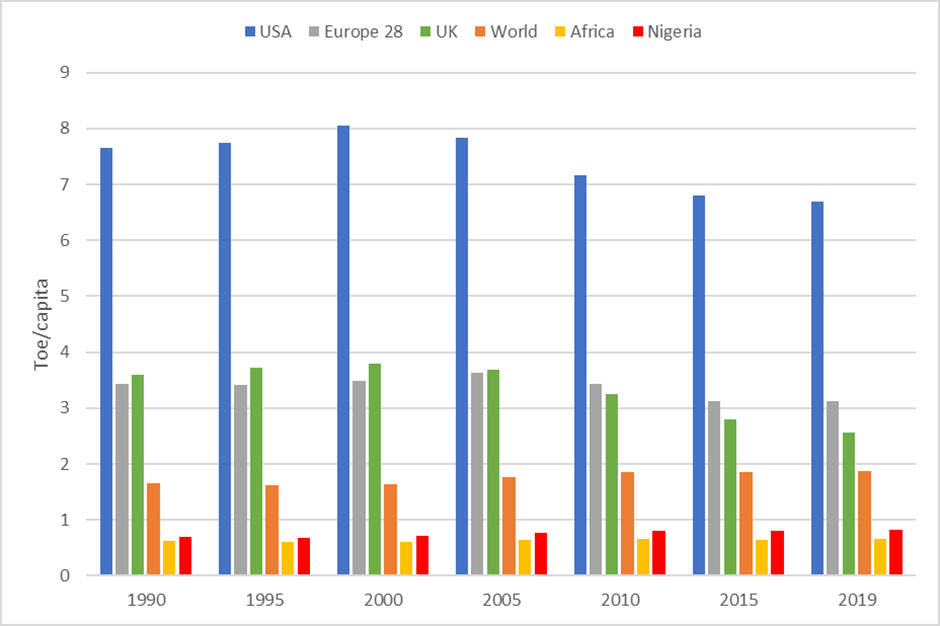
IEA Data
References
[1] F. Z. Thijs Van de Graafand, The Palgrave Handbook of the International Political Economy of Energy. 2016.
[2] UNDP, “SUSTAINABLE DEVELOPMENT GOALS GOAL 7: AFFORDABLE AND CLEAN ENERGY,” 2020. https://www.undp.org/content/undp/en/home/sustainable-development-goals/goal-7-affordable-and-clean-energy.html (accessed Feb. 07, 2020).
[3] Energypedia, “Nigeria Energy Situation,” [Online]. Available: https://energypedia.info/wiki/Nigeria_Energy_Situation.
[4] A. S. Aliyu, J. O. Dada, and I. K. Adam, “Current status and future prospects of renewable energy in Nigeria,” Renew. Sustain. Energy Rev., vol. 48, pp. 336–346, 2015, doi: 10.1016/j.rser.2015.03.098.
[5] A. Gungah, N. V. Emodi, and M. O. Dioha, “Improving Nigeria’s renewable energy policy design: A case study approach,” Energy Policy, vol. 130, no. April 2018, pp. 89–100, 2019, doi: 10.1016/j.enpol.2019.03.059.
[6] A. D. Musbaudeen O. Bamgbopa et al., “A Review of Nigerian Energy Policy Implementation and Impact,” Res. Gate, no. April, 2019, doi: 10.13140/RG.2.2.10422.14408.
[7] C. G. Ozoegwu, C. A. Mgbemene, and P. A. Ozor, “The status of solar energy integration and policy in Nigeria,” Renew. Sustain. Energy Rev., vol. 70, no. November 2016, pp. 457–471, 2017, doi: 10.1016/j.rser.2016.11.224.
[8] A. I. A. Olugbemisola W. Samuel, Sgolaha A. Oni, KC Samir, MArcus Wurzer, “Houselhold use of solid fuel for cooking and under-five infant mortality in Nigeria,” Africal Popul. Stud. Vol 32, No I (Supp), 2018, vol. 32, no. 1, pp. 4034–4042, 2018.
[9] GovServ Nigeria, “NIGERIAN ELECTRICITY REGULATORY COMMISSION.” https://www.govserv.org/NG/Abuja/177381052322940/Nigerian-Electricity-Regulatory-Commission (accessed Feb. 07, 2021).
[10] InfoGuide Nigeria, “The Role of State Government in Nigeria.” https://infoguidenigeria.com/role-state-government-nigeria/ (accessed Feb. 07, 2021).
[11] Federal Ministry of Power Works and Housing, “Federal Republic of Nigeria Rural Electrification Strategy and Implementation Plan,” no. July, 2016.
[12] Nigerian Government, “Nigeria Vision 20 : 2020 Economic Transformation Blueprint October 2009,” Transformation, no. October, 2009.
[13] Nigerian Government, “Rural Electrification Agency.” https://rea.gov.ng/.
[14] UNFCCC, “Nigerias’s Intended Nationally Determined Contribution,” Unfccc/Indc, 2015. https://www4.unfccc.int/sites/ndcstaging/PublishedDocuments/Nigeria First/Approved Nigeria’s INDC_271115.pdf.
[15] Department of Climate Change – Nigeria, “GREEN BONDS,” 2020. https://climatechange.gov.ng/2020/09/21/brief-on-green-bonds/.
[16] CISLAC, “CISLAC, the Nigerian Civil Society Legislative Advocacy Centre.” https://cislacnigeria.net/.
[17] CISLAC, “Corruption Perceptions Index 2018: ‘More is Required in the Fight against Corruption in Nigeria,’” 2019. https://cislacnigeria.net/corruption-perceptions-index-2018-more-is-required-in-the-fight-against-corruption-in-nigeria/.
[18] N. Odi, “Impact of corruption on economic growth in Nigeria,” Mediterr. J. Soc. Sci., vol. 5, no. 6 SPEC. ISSUE, pp. 41–46, 2014, doi: 10.5901/mjss.2014.v5n6p41.
[19] I. S. Ogundiya, “Political corruption in Nigeria: Theoretical perspectives and some explanations,” Anthropologist, vol. 11, no. 4, pp. 281–292, 2009, doi: 10.1080/09720073.2009.11891117.
[20] P. G. Fredriksson, H. R. J. Vollebergh, and E. Dijkgraaf, “Corruption and energy efficiency in OECD countries: Theory and evidence,” J. Environ. Econ. Manage., vol. 47, no. 2, pp. 207–231, 2004, doi: 10.1016/j.jeem.2003.08.001.
[21] D. Chukwu, “Senate Rejects 2021 Budget Of Rural Electrification Agency,” New Telegr. Niger., no. Oct 29 2020, 2020, [Online]. Available: https://www.newtelegraphng.com/senate-rejects-2021-budget-of-rural-electrification-agency/.
[22] Yobe State, “Governor Buni’s Inaugural Speech 29th May 2019,” 2020. [Online]. Available: https://yobestate.gov.ng/speeches/.
[23] E. Ostrom, Governing the commons: The evolution of institutions for collective action. 2015.
[24] M. J. BOYLE, “Tragedy Of The Commons – A Review,” Investopedia. https://www.investopedia.com/terms/t/tragedy-of-the-commons.asp#:~:text=The tragedy of the commons is a problem,depletion of the common resource, to everybody’s detriment.

